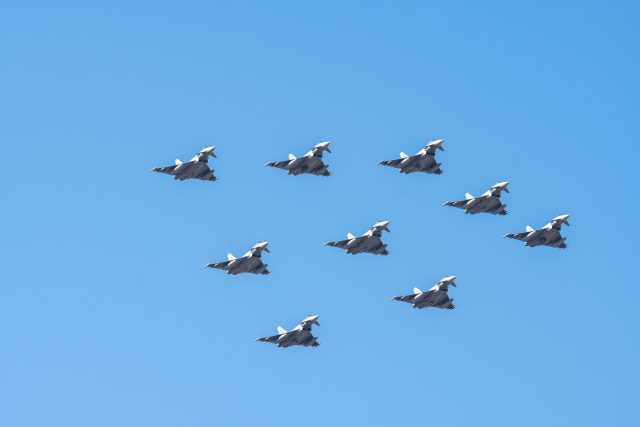
Baltic Air Policing mission underscores NATO’s vigilance amid escalating tensions
Italian fighter pilots are taking centre stage in one of Europe’s most delicate security missions as NATO confronts a new wave of Russian provocations over the Baltic region. In recent weeks, Italian aircraft deployed in Estonia have intercepted Russian jets seven times in just two months, responding to repeated violations of the Baltic state’s airspace. The incidents, described by Estonian officials as deliberate and unprecedented in duration, highlight the fragile balance of power along NATO’s eastern flank and the increasing risks posed by Moscow’s assertive military posture.
The most alarming episode occurred when Russian aircraft entered Estonian sovereign airspace for a full 12 minutes, an intrusion that Estonian Defence Minister Hanno Pevkur called “unacceptable” during remarks at the Warsaw Security Forum. While Russian planes have previously breached Estonian airspace, such encounters typically last only seconds. “These were 12 minutes without precedent,” Pevkur emphasized, underscoring the seriousness of the event.
According to Pevkur, NATO’s air policing units—currently led by the Italian Air Force—reacted swiftly. Italian jets scrambled to intercept the Russian aircraft, which were approaching from the direction of international waters. Despite repeated attempts at communication, the Russian pilots remained unresponsive. “They did not react to NATO fighters, they did not respond to air traffic communications,” Pevkur said. “No one can claim they didn’t know where they were. They knew perfectly well they were in NATO airspace and did nothing to leave voluntarily. That is why we had to use signals and force.”
The Baltic Air Policing mission, a core NATO operation since 2004, provides round-the-clock defense for the airspaces of Estonia, Latvia, and Lithuania—countries that lack sufficient fighter aircraft of their own. Member nations rotate deployments to ensure a constant presence. Italy’s participation, with Eurofighter Typhoons stationed at Ämari Air Base in Estonia, reflects Rome’s growing commitment to collective defence at a time of heightened tensions with Russia.
While Moscow has long engaged in probing flights near NATO borders, the recent incursion stands out for its brazenness. Pevkur warned that the incident cannot be dismissed as a navigational error, as some analysts have speculated. “Many suggest it might have been a mistake,” he said, “but the reality is that the pilots ignored all communication attempts. They knew exactly where they were.”
Estonia responded by invoking Article 4 consultations within NATO, a provision used when a member perceives a threat to its territorial integrity or security. Tallinn also brought the matter before the United Nations Security Council, where it presented radar imagery proving the violation. However, Pevkur noted that Russian representatives “lied to the United Nations, denying the incursion despite the evidence.”
The confrontations underscore the broader strategic stakes in the Baltic region. Since Russia’s invasion of Ukraine in 2022, NATO has bolstered its presence along its eastern frontier with additional troops, air defence systems, and frequent exercises. Air policing missions are a crucial component of this deterrence posture, designed to ensure that any breach of allied airspace is met with an immediate and professional response.
For Italy, the mission represents both a challenge and an opportunity. The Italian Air Force has a long history of participating in NATO operations, but the current deployment places Italian pilots at the forefront of Europe’s most volatile security environment. Their role goes beyond routine patrols: it sends a message of unity and readiness to both allies and adversaries.
The 12-minute standoff serves as a reminder that the Baltic skies remain a flashpoint where miscalculations could have far-reaching consequences. As NATO continues to adapt to Russia’s unpredictable behaviour, the presence of Italian fighters in Estonia demonstrates the alliance’s resolve to defend every inch of its territory.
Pevkur summed up the gravity of the situation with a warning to the international community: “This is the reality we face every day. They have violated our airspace before, but never for so long. Everyone understands this is unacceptable.” With Russian jets testing NATO’s defences and diplomatic channels offering little reassurance, Italy’s steadfast performance in the Baltic mission underscores not only the importance of vigilance but also the enduring value of collective defence in an era of renewed geopolitical confrontation.



 Subscribe
Subscribe